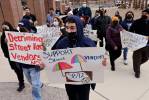Taxation without representation
A deputy attorney general told them they couldn't do it. This newspaper told them they shouldn't do it. The state attorney general sued them and said they couldn't do it legally. The Legislature even changed the wording of the law to explicitly say they couldn't do it, even though existing law never allowed it in the first place.
But still the state Tax Commission insisted it was within the law and should be able to conduct secret hearings on tax appeals and vote behind closed doors, as they had done for 30 years.
Arguing before the state Supreme Court, the commission's privately contracted attorney, Thomas "Spike" Wilson, said it was "nonsense" to think commissioners could deliberate in public without mentioning confidential tax information. "If a hearing is open, then it is open. If it is closed, it is closed."
That bit of futile argumentation on behalf of keeping the taxpayers locked out cost the self-same taxpayers $500,000 -- an obscene waste in a system awash in obscene wastes.
On Thursday, the state Supreme Court swept aside all such dissembling and made it abundantly clear that the Tax Commission violated the state open meeting law in 2005 by secretly granting a $40 million tax refund to Southern California Edison.
The unanimous opinion, penned by Justice James Hardesty, reversed a lower court decision and voided the refund -- meaning, if Edison still desires a $40 million state-issued check, it will have to go back to the commission and have deliberations and voting on the refund request take place in public.
The commission had argued it was exempt from the open meeting law because of a statute that allowed it to receive confidential taxpayer information in closed session.
Justice Hardesty wrote that the law "applicable at the time of Edison's tax appeal created a limited exception to the Open Meeting Law under which the Tax Commission could close, at a taxpayer's request, only the portion of the Tax Commission's session at which it received confidential evidence, and questioned witnesses, and heard argument concerning confidential information."
"The exception did not permit the Tax Commission to hold all portions of the taxpayer appeal hearings in closed sessions. Under the Open Meeting Law, the Tax Commission was required to receive nonconfidential evidence, deliberate, and vote in open session."
To clinch his conclusion, Hardesty unearthed legislative intent that belied the stance the commission had taken for years.
Back in 1983, Patrick Pine, then executive director of the Department of Taxation, asked the Legislature to amend a law that made it a criminal offense for anyone to reveal confidential taxpayer information. That apparently included the members of the Tax Commission. So Pine proposed an exception that would protect the commissioners who might inadvertently reveal confidential information while publicly discussing a tax appeal.
According to the court ruling, "Pine stated that 'the deliberative decision making process require[d] full discussion in open meeting.' Pine explained that providing public access to the factual reasons for the Tax Commission's decisions aids the public in evaluating their possible appeals and in assuring public awareness of fair treatment between taxpayers in the same industry."
The lawmakers granted the immunity, leaving the court to conclude the intent was that the tax commissioners must deliberate in open session.
In this past session of the Legislature, Assembly Speaker Barbara Buckley rammed through an amendment to the law clearly stating meetings should be closed only for receiving confidential taxpayer information and all other aspects must be open.
How many different ways can the same thing be stated?
The principle of openness was instituted in our representative form of government to ensure the governed could scrutinize the dealings of our public officials to make sure their actions are always in our best interest and not skewing to special interests, cronies, relatives or those making kickbacks.
The Nevada Constitution dictates "uniform and equal rates of assessment and taxation."
There is no way for the public to ascertain whether this is being carried out when it is closed out of the deliberations and voting on tax refunds.
Or as I like to call it: Taxation without representation.
That's not nonsense.
Thomas Mitchell is editor of the Las Vegas Review-Journal and writes about the role of the press and access to public information. He may be contacted at 383-0261 or via e-mail at tmitchell@ reviewjournal.com.






















